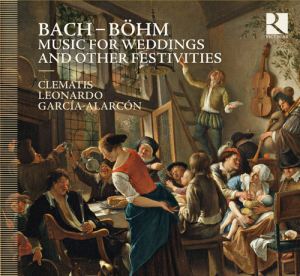 |
 |
|

Support us financially by purchasing this disc from:
|
|
|
|
|
|
|
|
Georg BÖHM (1661-1733)
Mein Freund ist mein - cantata for soprano, alto, tenor and bass
[18:54]
Johann Sebastian BACH (1685-1750)
Der Herr denket an uns - cantata for soprano, alto, tenor and bass
BWV
196 [11:04]
Quodlibet: Was seind das vor grosser Schlösser BWV 524 with
additions
by Leonardo Garciá Alarcon [12:01]
Johann Christoph BACH (1642-1703)
Meine Freundin, du bist schön - cantata for soprano,
alto, tenor and bass (1679) [26:05]
 Mariana Flores (soprano), Paulin Büngden and Steve Dugardin
(countertenors),
Fernando Guimarães (tenor) and Christain Immler and Philippe
Favette
(basses)
Mariana Flores (soprano), Paulin Büngden and Steve Dugardin
(countertenors),
Fernando Guimarães (tenor) and Christain Immler and Philippe
Favette
(basses)
Clematis/Leonardo Garciá Alarcon
rec. March and November 2011, Beaufays, église Saint-Jean
l’Évangéliste
Texts and translations included
 RICERCAR RIC 323 [68:05]
RICERCAR RIC 323 [68:05]
|
|
|
Subtitled Music for Weddings and Other Festivities this disc brings
together
music largely influenced by the Song of Songs, which was extremely popular
amongst
Catholic and Lutheran composers of the time. The first to submit to its
erotic
lure, programmatically at any rate, is Georg Böhm (1661-1733), a
generation
older than J.S. Bach. Bach however knew and admired Böhm and worked
with
him in Lüneburg, where the older man was resident organist. They were
to
remain in contact for the rest of Böhm’s life. Mein Freund
ist
mein is a cantata for soprano, alto, tenor and bass, string
accompaniment
and bass continuo.
The French would call this work a ‘concert spiritual’ as much
as
a cantata, with some incessantly repeated ecstatic textual repetitions
underpinned
and grounded by strong counterpoint. Motifs recur throughout in a highly
impressive
organisational way, ensuring thematic binding and unity. Soprano Mariana
Flores
sings her divisions with liquid authority over the sensitive organ’s
warm
registrations. Meanwhile the string counterpoint to the alto aria is well
characterised
by the small ensemble of Clematis (nice name for a group). The bass aria
is
perkier with correspondingly perkier organ playing and by now the music is
so
closely intertwined that the final chorus makes a most impressive
impression
- amplitude coupled with breadth.
Johann Christoph Bach was JS’s first cousin once removed and a
distinguished
organist, Johann Sebastian referred to his cousin as ‘a profound
composer’
and often performed his works. Meine Freundin, du bist schön
is
a cantata for soprano, alto, tenor and bass, written in all probability
for
his own marriage in 1679. It has at its heart a long and involved
chaconne,
here used as a kind of erotic promenade, in which the soprano thinks
passionate
thoughts: the dissonances serve only to exaggerate the latent - not so
latent,
let’s be honest - sexiness of the text (‘he feedeth among the
roses,
and he lingers also with me.’). This celebratory work is a richly
decorative
and engaging one, revealing JC to be a forward looking composer, and one
with
impeccable technical control.
J.S. Bach’s Der Herr denket an uns is a wedding cantata. It
is
a brief work that calls for four solo singers but its truncation has led
to
speculation that what has survived is a torso. Certainly, it seems to lack
a
second part, and there’s no concluding chorale. The verses from
Psalm
115 are set in successive verses, and Bach opens with an instrumental
sinfonia
adding da capo arias, grounded in the new style Italian opera not
concerts
spirituels such as attracted Böhm. The Quodlibet Was seind das
vor
grosser Schlösser BWV524 is a prankish affair. Following the
initial
noble opening the Bach clan would sing choruses of popular songs and often
facetious
ones crammed in this case with proverbs and chaff. This quodlibet lacks a
beginning
and an end, which leaves the middle. This performance tries to reproduce
the
air of silliness and collective improvisation, whilst also maintaining the
quodlibet’s
form. Into the void of the missing finale steps conductor Leonardo
Garciá
Alarcon. He filches the last of the Goldberg Variations and bungs it in.
Yes,
it too is a quodlibet. Good fun is ensured, unless you’re of the
stuffy
disposish.
Full texts and translations are included. Recording quality is first
class.
Jonathan Woolf
Masterwork Index: Bach cantata 196
Support us financially by purchasing this disc from:
|
|
|
|
|
|
|
|
|












